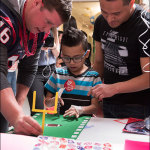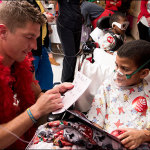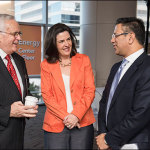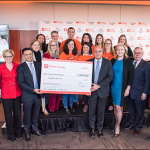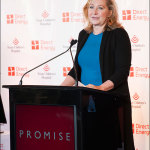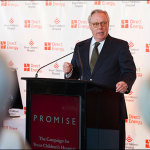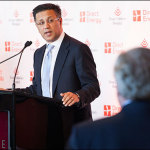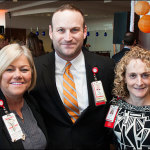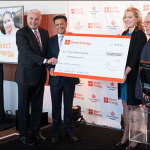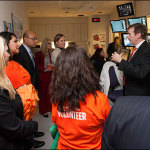 On February 10, in honor of Heart Month, Houston Texans Brian Peters and Jon Weeks, Houston Texans Cheerleaders and TORO brought smiles to patients at Texas Children’s Heart Center. The players, cheerleaders and TORO also got into the Valentine’s Day spirit as they posed for shots in a photo booth, made cards, signed autographs and brought smiles to patient families. To see more pictures from the Texans visit, see below. To watch a video of the visit, click here.
On February 10, in honor of Heart Month, Houston Texans Brian Peters and Jon Weeks, Houston Texans Cheerleaders and TORO brought smiles to patients at Texas Children’s Heart Center. The players, cheerleaders and TORO also got into the Valentine’s Day spirit as they posed for shots in a photo booth, made cards, signed autographs and brought smiles to patient families. To see more pictures from the Texans visit, see below. To watch a video of the visit, click here.
An armadillo with thick, long eyelashes whistles as she notices a problem with the blood flow in a child’s heart. Almost immediately an army of robot-like caregivers race into the hospital room and fix the problem.
No, this is not your typical medical setting. This is an imaginary world made to help children with heart problems better understand their diagnosis and potential treatment options. Created by a team led by Chief of Cardiology Dr. Daniel Penny, the series of almost 40 animated videos features Ruby, an armadillo; Beau, a bison; and a group of caregivers called Blings.
Ruby and Beau’s role in the videos is to identify the problem with a child’s heart, call in the Blings for help and explain – in very simple terms – what’s happening and how it’s affecting the patient. The Blings fix whatever is wrong while hopping in and out of colorful cars and using a cadre of MacGyver-like tools.
“The aim of our project is to improve the health literacy of the children and parents who come to us with heart disease,” Penny said. “If we can empower them through information, we can likely improve their treatment outcome and overall quality of life.”
To effectively communicate complex issues such as ventricular septal defect and patent ductus arteriosis, Penny is working with Michael Liddy, a friend and Australian animator, to script the 4- to 7-minute videos and create their characters, sound effects and musical score, all of which are done very intentionally and with the young age of the viewer in mind.
An additional bonus to the production of the videos, which is being funded by a grant from ExxonMobil, is the voices of Ruby and Beau are recorded at Texas Children’s Hospital by employees Hasti Taghi and Dr. Stuart Hall.
“We were very lucky to get the voices of Ruby and Beau in house,” Penny said. “They definitely add a special touch.”
To date, six of the videos in the series have been completed and were unveiled at a February 15 red carpet premier at Texas Children’s Pavilion for Women (click here to view a video). Doctors, patients and families across the organization and beyond can access the videos via Texas Children’s website at http://www.texaschildrens.org/hearteducation.
Penny and his team will continue to add to the animated series and work on another series of videos that educate patients on certain types of routine procedures done at the average heart center.
“We hope that having a program like this any child who enters a heart center will be able to get a feel for what they are going to experience,” Penny said.
Bench and Bedside is a digest of the previous month’s stories about the clinical and academic activities of our physicians and scientists. We welcome your submissions and feedback.
January 5
Zoghbi to receive Vanderbilt prize in Biomedical Science
 Dr. Huda Zoghbi, professor of molecular and human genetics at Baylor College of Medicine, and director of the Jan and Dan Duncan Neurological Research Institute at Texas Children’s, will be honored with the 2015 Vanderbilt Prize in Biomedical Science. This award is given by the Vanderbilt University School of Medicine to recognize women scientists with a stellar record of research accomplishment who have also mentored other women in science. More
Dr. Huda Zoghbi, professor of molecular and human genetics at Baylor College of Medicine, and director of the Jan and Dan Duncan Neurological Research Institute at Texas Children’s, will be honored with the 2015 Vanderbilt Prize in Biomedical Science. This award is given by the Vanderbilt University School of Medicine to recognize women scientists with a stellar record of research accomplishment who have also mentored other women in science. More
January 5
Second location of The Center for Children and Women celebrates milestone
 Texas Children’s Health Plan recently celebrated the first anniversary of The Center for Children and Women in Southwest Houston. During the past 12 months, the Center has provided care to more than 5,800 patients, including 356 births, demonstrating The Center’s remarkable footprint in the community. More
Texas Children’s Health Plan recently celebrated the first anniversary of The Center for Children and Women in Southwest Houston. During the past 12 months, the Center has provided care to more than 5,800 patients, including 356 births, demonstrating The Center’s remarkable footprint in the community. More
January 12
Dr. Sanjeev Vasudevan selected for Baylor Young Alumni Award
Dr. Sanjeev Vasudevan will receive the 2016 Young Alumnus Award from the Baylor College of Medicine Alumni Association. Vasudevan is a pediatric surgeon and researcher specializing in pediatric cancers such as neuroblastoma, liver cancer, renal tumors and sarcomas. More
January 12
Harpavat receives ASSLD award for study on newborn screening tool to detect biliary atresia earlier
Dr. Sanjiv Harpavat, a pediatric gastroenterologist at Texas Children’s and Baylor College of Medicine, received the 2015 Jan Albrecht Clinical and Translational Research Award in Liver Diseases from the American Association for the Study of Liver Diseases (AASLD) Foundation. His study titled, “Assessment of a Novel Newborn Screening Tool for Biliary Atresia,” explores a new strategy to detect infants with biliary atresia earlier. More
January 12
Pediatric Surgeon Dr. Sundeep Keswani awarded visiting professorship
Dr. Sundeep Keswani, pediatric surgeon, was chosen by the Association for Academic Surgery to receive the 2016 International Visiting Professorship Award to attend the Columbia Surgical Association Congress in Bogota, Colombia, in August 2016. Keswani is the principal investigator for the Texas Children’s Laboratory for Regenerative Tissue Repair. More
January 12
Family Fertility Center advances innovative research to improve IVF process
 From exploring the metabolic factors impacting egg quality to the genetics of embryo implantation, Family Fertility Center researchers at Texas Children’s Pavilion for Women are engaged in several fascinating studies to help infertile couples achieve successful pregnancy outcomes. Read about the various studies in progress. More
From exploring the metabolic factors impacting egg quality to the genetics of embryo implantation, Family Fertility Center researchers at Texas Children’s Pavilion for Women are engaged in several fascinating studies to help infertile couples achieve successful pregnancy outcomes. Read about the various studies in progress. More
January 19
Three Texas Children’s Cancer Center researchers receive prestigious ASH awards
The American Society of Hematology (ASH) recognized three researchers from Texas Children’s Cancer Center and Baylor College of Medicine for their work in advancing our understanding of disease pathogenesis and exploring novel innovative approaches for the treatment of pediatric cancers. More
January 19
Texas Children’s uses advanced orthopedic imaging, less radiation exposure
 Texas Children’s is the first pediatric hospital in the southwest to offer advanced orthopedic imaging that provides full body, 3-D views of a patient’s bone structure using less radiation. Because of the low radiation dose, EOS imaging is beneficial for orthopedic patients with scoliosis and other spinal deformities who require frequent imaging to monitor disease progression. More
Texas Children’s is the first pediatric hospital in the southwest to offer advanced orthopedic imaging that provides full body, 3-D views of a patient’s bone structure using less radiation. Because of the low radiation dose, EOS imaging is beneficial for orthopedic patients with scoliosis and other spinal deformities who require frequent imaging to monitor disease progression. More
January 26
Texas Children’s Hospital welcomes expert pediatric hand surgeon
Texas Children’s Hospital is excited to welcome Dr. William Pederson, a highly-regarded pediatric hand surgeon, to the Department of Surgery. Pederson, whose appointment was effective in January, also is a professor of surgery and pediatrics at Baylor College of Medicine. More
January 26
Texas Children’s Heart Center welcomes trio of cardiologists
Texas Children’s Heart Center has welcomed three new pediatric cardiologists to the team. Drs. Tobias Schlingmann, Betul Yilmaz and Justin Zachariah joined Texas Children’s in July. More
 Bioengineers at Texas Children’s Hospital and Rice University have won a National Institutes of Health grant to develop a new generation of patches to repair the damaged hearts of infants.
Bioengineers at Texas Children’s Hospital and Rice University have won a National Institutes of Health grant to develop a new generation of patches to repair the damaged hearts of infants.
The $1.9 million, 5-year grant will allow Jeffrey Jacot and his team to take the next steps in a long-running drive to improve the survival rates of such infants, many of whom are diagnosed in utero and require surgery soon after birth.
Jacot, who has appointments at Rice and Texas Children’s, and his colleagues will test patches that encourage a child’s own heart cells to invade and, over time, regenerate tissue to repair birth defects.
The multilayer patches include a rudimentary preformed vasculature – a blood-vessel system – that encourages cells to migrate. Over time, as the cells form organ tissue, the patches degrade and leave the body. The new tissue will ideally grow with the heart and have no fibrous scar that could interfere with its normal operation.
“Our goal is to have something that blends in with the tissue, so you can’t tell it’s a patch,” Jacot said. “It grows with the rest of the heart, and you don’t have these issues that you have with a piece of plastic.”
Jacot said cell survival in forming tissue has limited the effectiveness of such scaffolds until now. “We think if it has a good vasculature, it can recruit the cells that it needs,” he said. Preliminary studies show the immature vasculature hooks into the heart’s existing system “fairly quickly without needing to be surgically attached,” he said.
The study initially will be geared toward infants who suffer from Tetralogy of Fallot, a birth defect in which blood bypasses the lungs. The problem occurs in 4.7 of every 10,000 infants born in the United States. Cell-free patches are currently used to repair the damage, but they neither degrade nor grow with the infant and often need to be replaced, Jacot said.
“The surgeons we work with feel like there needs to be something better,” Jacot said. “What they see is that 10 to 20 percent of patches need to be replaced over time for various reasons, like if it has a severe strain or calcifies.”
The proposed new patches consist of a polyurethane core strong enough to handle sutures and the constant stress provided by a beating heart, surrounded by a porous gel that will welcome cells from neighboring heart tissue.
The lab had already derived endothelial cells and mesenchymal stem cells from amniotic fluid stem cells and determined that combining them in a hydrogel scaffold induces the formation of a rudimentary vascular structure. The use of readily available amniotic stem cells from a newborn’s own mother cuts the risk of tissue rejection, Jacot said.
 Texas Children’s Heart Center has welcomed three new pediatric cardiologists to the team. Drs. Tobias Schlingmann, Betul Yilmaz and Justin Zachariah joined Texas Children’s in July.
Texas Children’s Heart Center has welcomed three new pediatric cardiologists to the team. Drs. Tobias Schlingmann, Betul Yilmaz and Justin Zachariah joined Texas Children’s in July.
“We are thrilled to welcome three new cardiologists,” said Dr. Daniel Penny, chief of cardiology at Texas Children’s Hospital and section head and professor of pediatrics-cardiology at Baylor College of Medicine. “Drs. Schlingmann, Yilmaz and Zachariah bring expertise which will help us continue to remain a preeminent cardiology program and better serve our patients and their families.”
Schlingmann, who also serves as an assistant professor of pediatrics-cardiology at Baylor College of Medicine, received his undergraduate and medical degrees from the University of Hamburg, Germany. He completed his residency in pediatrics and fellowship in pediatric cardiology at Boston Children’s Hospital. Furthermore, he completed a senior fellowship in non-invasive cardiac imaging at Boston Children’s Hospital. Schlingmann’s clinical interests include the diagnosis and treatment of cardiovascular disease in infants, children, and adolescents in both the inpatient and outpatient settings.
Yilmaz, who also serves as an assistant professor of pediatrics-cardiology at Baylor, earned a combined Bachelor of Science and medical degree at Istanbul University. She did basic research in genetics at the University of Chicago Medical Center and completed a pediatric residency at Washington University in St. Louis and a pediatric cardiology fellowship at Columbia-Cornell University Medical Centers. She also completed an advanced imaging/fetal cardiology fellowship at Cincinnati Children’s Hospital Medical Center. Yilmaz’s clinical interests include utilization of advanced cardiac imaging modalities such as echocardiography and fetal echocardiography to improve the diagnosis and management of congenital heart disease in fetuses and in pediatric population.
Zachariah, who also serves as an assistant professor of pediatrics-cardiology at Baylor, earned Bachelor of Arts degree at Rice University and medical degree at Baylor College of Medicine. He earned a Masters of Public Health from Harvard University and completed his pediatric residency at the University of California San Francisco. He also completed a clinical cardiology fellowship at Boston Children’s Hospital and a visiting research fellowship with the Framingham Heart Study, supported by the National Heart, Lung and Blood Institute. Zachariah’s clinical interests include preventive cardiology in order to help patients avoid future cardiac disease and events such as heart attack and stroke through early detection and intervention.
Bench and Bedside is a digest of the previous month’s stories about the clinical and academic activities of our physicians and scientists. We welcome your submissions and feedback.
December 1
Texas Children’s Fetal Center celebrates 400 miracles at patient reunion
Hundreds of families from around the country traveled to Houston to attend Texas Children’s Fetal Center family reunion. Since its inaugural event in 2007, the reunion provided an opportunity for physicians and staff to reunite with patient families who received life-saving medical and surgical care at our fetal center.
December 1
Texas Children’s awards pediatric pilot grants to 10 promising researchers
Ten promising researchers received the 2015 Pediatric Pilot Awards Research grants worth up to $50,000. The grants will provide initial start-up funding for research projects that have the ultimate goal of enhancing patient outcomes.
December 8
Dr. Mary Brandt elected to ACS Medical Student Education Committee
Dr. Mary Brandt, pediatric surgeon and director of the Adolescent Bariatric Surgery Program and the Anorectal Malformation Clinic at Texas Children’s, has been elected to the Medical Student Education Committee of the American College of Surgeons, which addresses the educational needs in surgery for medical students during all four years of medical school.
December 15
Texas Children’s Special Isolation Unit earns award from Texas Department of Health Services
Texas Children’s Special Isolation Unit, the only pediatric-focused unit of its kind in Texas and the Southwest, was recently awarded the Texas Department of Health Services 2015 Texas Preparedness Leadership Award. The annual award recognizes exceptionally meritorious achievements in local, regional or state Public Health Emergency Preparedness and Healthcare Systems Preparedness Programs.
December 15
Texas Children’s Main Campus Urgent Care opens
 Texas Children’s recently opened a 4,100-square-foot urgent care clinic on the second floor of the Abercrombie Building, creating a system-wide solution to effectively manage the Emergency Center’s (EC) low acuity patient population. The clinic has a dedicated staff of physicians, advanced practice providers, nurses and clinical support staff. The new urgent care has already helped lighten the load of the EC, seeing about 30 patients a day, or 25 percent of the EC’s daily patient volume. Wait times for patients with low-acuity illnesses also have decreased significantly.
Texas Children’s recently opened a 4,100-square-foot urgent care clinic on the second floor of the Abercrombie Building, creating a system-wide solution to effectively manage the Emergency Center’s (EC) low acuity patient population. The clinic has a dedicated staff of physicians, advanced practice providers, nurses and clinical support staff. The new urgent care has already helped lighten the load of the EC, seeing about 30 patients a day, or 25 percent of the EC’s daily patient volume. Wait times for patients with low-acuity illnesses also have decreased significantly.
December 15
Texas Children’s oncologists contribute to leading textbook in field
 Dr. David Poplack, director of Texas Children’s Cancer and Hematology Centers, and numerous members of his medical staff helped write the recently published, 7th edition of Principles and Practice in Pediatric Oncology. This leading textbook provides the most comprehensive resource on the biology and genetics of childhood cancers.
Dr. David Poplack, director of Texas Children’s Cancer and Hematology Centers, and numerous members of his medical staff helped write the recently published, 7th edition of Principles and Practice in Pediatric Oncology. This leading textbook provides the most comprehensive resource on the biology and genetics of childhood cancers.
December 15
Spotlight on Adult Congenital Heart Disease Program
 About 40,000 babies are born each year with a congenital heart disease, the most common birth defect. These children grow up with their conditions and are part of a growing population of adults with congenital heart disease. Texas Children’s Adult Congenital Heart Disease Program allows patients to continue their care at their childhood medical home as adults.
About 40,000 babies are born each year with a congenital heart disease, the most common birth defect. These children grow up with their conditions and are part of a growing population of adults with congenital heart disease. Texas Children’s Adult Congenital Heart Disease Program allows patients to continue their care at their childhood medical home as adults.
December 22
Heart Center experts present at Pediatric Cardiac Intensive Care Society 11th International Meeting
 Intensivists, cardiologists, cardiovascular surgeons, nurses, and outcomes and quality experts from Texas Children’s Heart Center and Baylor College of Medicine served as presenters and moderators during the Pediatric Cardiac Intensive Care Society (PCICS) 11th International Meeting held December 9 through 11 in Houston.
Intensivists, cardiologists, cardiovascular surgeons, nurses, and outcomes and quality experts from Texas Children’s Heart Center and Baylor College of Medicine served as presenters and moderators during the Pediatric Cardiac Intensive Care Society (PCICS) 11th International Meeting held December 9 through 11 in Houston.
December 22
Surgical Research Day 2016 to feature new poster session
Plans are underway for the sixth annual Edmond T. Gonzales, Jr., Surgical Research Day which will be held on May 6, 2016. At this session, poster authors will have an opportunity to present their research to reviewers as scoring takes place.
December 22
L. E. Simmons Chair in Orthopedics awarded to Dr. John Dormans
Chief of Orthopedics Dr. John Dormans was recently awarded the L.E. Simmons Chair in Orthopedics. Provided by the Houston Endowment in recognition of Simmons, who served as chairman of Texas Children’s Board of Trustees from 2003-2004, the purpose of this chair is to support orthopedic research, education, clinic program development and advocacy at Texas Children’s.
 At a December 18 celebration, Texas Children’s Hospital announced a $5 million commitment from Direct Energy to the hospital’s Promise Campaign. The gift will be used to help expand Texas Children’s Heart Center in order to serve more children in the Houston community, Texas and the nation.
At a December 18 celebration, Texas Children’s Hospital announced a $5 million commitment from Direct Energy to the hospital’s Promise Campaign. The gift will be used to help expand Texas Children’s Heart Center in order to serve more children in the Houston community, Texas and the nation.
Direct Energy’s commitment is the largest corporate gift ever made to a Texas Children’s campaign priority. Nearly 200 employees from both institutions gathered at Texas Children’s to celebrate and hear remarks from Mark A. Wallace, president and CEO of Texas Children’s; Michael C. Linn, a member of Texas Children’s Board of Trustees and chair, along with his wife Carol, of the Promise Campaign; and Badar Khan, president and CEO of Direct Energy.
“Direct Energy’s generous support will help ensure Texas Children’s is able to continue to provide highly specialized care to each and every child who comes to us for help – and particularly to those who are the most critically ill and have the most complex needs,” Wallace said.
One of the highest priorities within the Promise Campaign is the expansion of the critical, surgical and emergency care services and facilities at the Texas Medical Center campus, including Texas Children’s Heart Center.
“Texas Children’s is a world-class provider of pediatric care and Direct Energy is proud to join forces with this extraordinary institution and make this meaningful gift,” Khan said. “We know our partnership with Texas Children’s will make a difference in the health and well-being of countless children and families.”
Texas Children’s recently began construction on a new 640,000-square-foot, 19-story pediatric tower. Texas Children’s Heart Center will be expanded and relocated to this pediatric tower to provide complex care more efficiently and serve even more patients. The new facility will also house pediatric intensive care units, cardiovascular intensive care units and operating rooms.
Texas Children’s Heart Center is ranked No. 2 nationally in cardiology and heart surgery by U.S. News & World Report. Each year, Texas Children’s Heart Center specialists see 20,000 patients in outpatient clinics. In 2014, Texas Children’s surgeons performed 900 congenital heart surgeries and 32 heart transplants – more than any other pediatric hospital in the nation. Texas Children’s has also pioneered many of the now-standard cardiac procedures used around the world.
Promise: The Campaign for Texas Children’s Hospital is a comprehensive, $475 million fundraising effort launched in 2014 to help ensure the hospital meets the increasing need for specialized care for Houston’s rapidly growing pediatric community. For more information about the Promise campaign, visit www.texaschildrens.org/promise.


